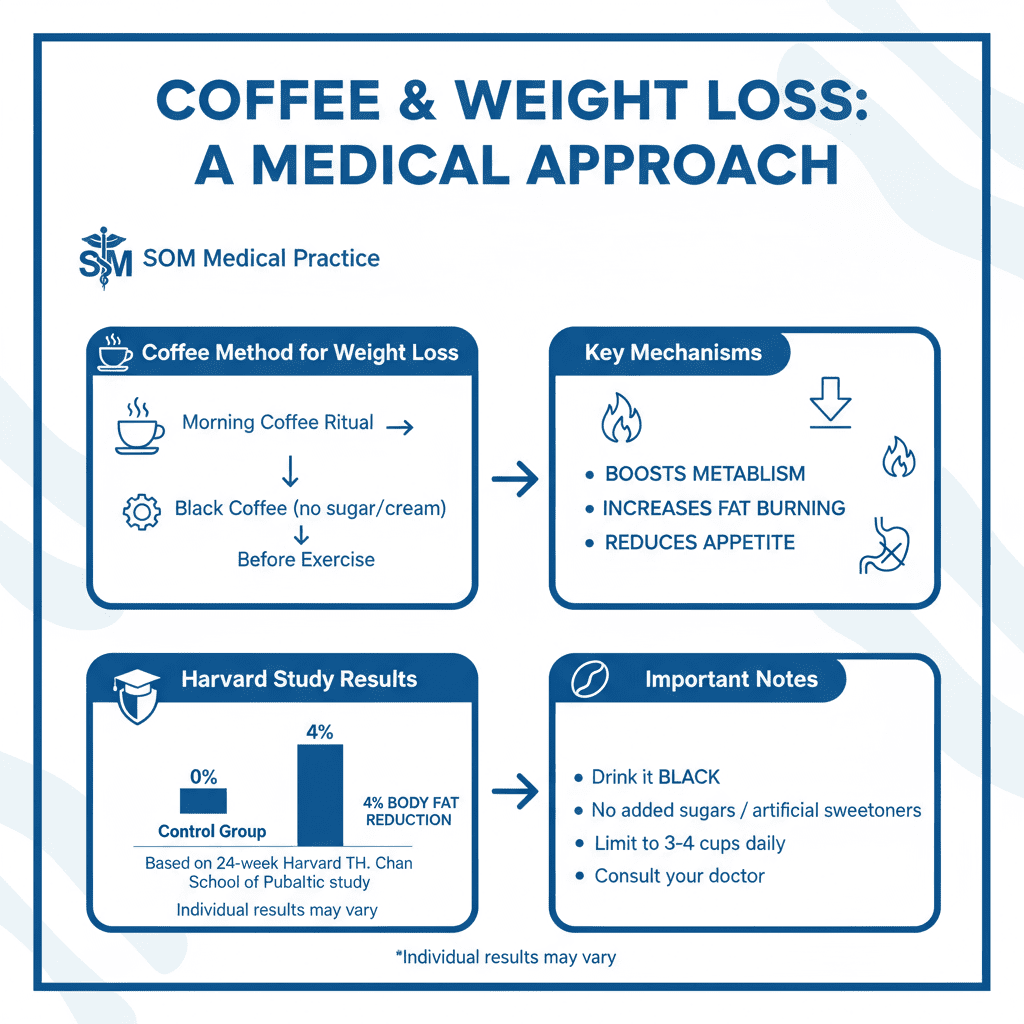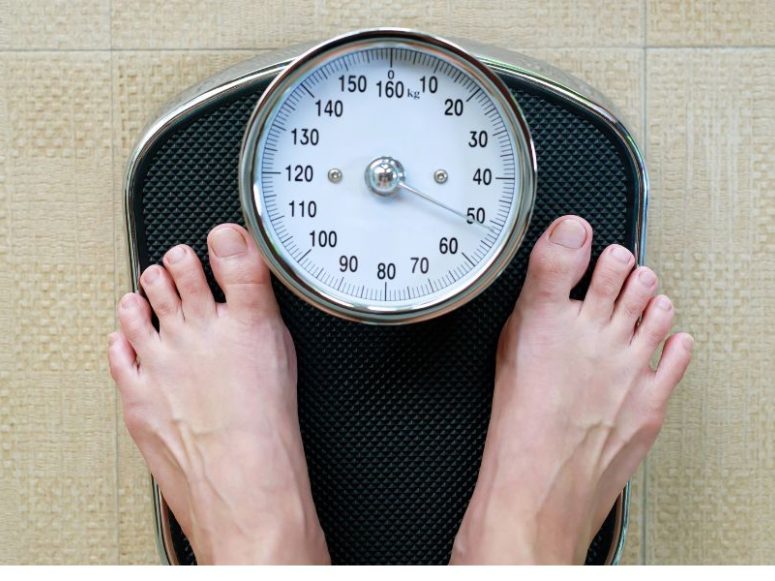Key Takeaways
- Scientific studies show that caffeine, the active ingredient in coffee, can modestly boost metabolism, increase fat burning, and reduce appetite, all of which can contribute to weight loss.
- Research from Harvard suggests that drinking four cups of coffee per day may lead to a small reduction in body fat, but it is not a magic solution for significant weight loss.
- To get the potential weight loss benefits of coffee, it is best to drink it black, as adding sugar, cream, and other high-calorie ingredients can easily negate any positive effects.
In the world of weight loss trends, the "coffee method" has gained popularity as a simple and enjoyable way to shed a few pounds. But is there any science to back up these claims, or is it just another health fad? As a trusted healthcare provider in Western New York, SOM Medical Practice is here to separate fact from fiction. This article delves into the research behind the coffee method for weight loss, explaining how it works and what you should know before you start brewing an extra pot.

1. The Science Behind Coffee and Weight Loss
The idea that coffee can aid in weight loss is not new, and it is primarily linked to its main active ingredient: caffeine. Caffeine is a natural stimulant that can have several effects on your body's metabolism.
- Boosts Metabolism: Caffeine can increase your metabolic rate, which is the rate at which your body burns calories at rest. A 1980 study found that caffeine intake significantly increased metabolic rate for up to three hours after consumption [1]. While the effect is modest, over time, it can contribute to a calorie deficit.
- Increases Fat Burning (Oxidation): Caffeine can also stimulate the nervous system, which sends direct signals to the fat cells, telling them to break down fat. A systematic review of 94 studies confirmed that caffeine ingestion significantly increases fat metabolism [2].
- Reduces Appetite: Some studies suggest that coffee may help reduce appetite, leading you to consume fewer calories throughout the day. A 2025 study noted that caffeine is studied as a viable aid in weight loss, especially for those who are overweight or have obesity, due to its appetite-suppressing effects [3].
2. What Do the Clinical Studies Show?
While the mechanisms are plausible, what do the clinical trials say about actual weight loss results? The evidence suggests that while coffee can help, the effects are generally modest.
A 2020 study from the Harvard T.H. Chan School of Public Health provided some interesting insights. In a 24-week investigation, overweight adults who drank four cups of regular coffee per day saw a modest reduction in body fat of about 4% compared to those who drank a placebo [4]. The researchers believe this was likely due to the caffeine increasing the participants' metabolism.
Furthermore, a large 2019 meta-analysis of 13 randomized controlled trials concluded that caffeine intake might promote weight, BMI, and body fat reduction. The study found a dose-response relationship, suggesting that for every doubling of caffeine intake, the mean reduction in weight, BMI, and fat mass increased by 22%, 17%, and 28%, respectively [5].
3. The "Coffee Method" in Practice: How to Do It Right
There is no single, official "coffee method," but the general idea is to incorporate coffee into your daily routine in a way that supports weight loss. Here are some practical tips based on the research:
- Drink It Black: The key to using coffee for weight loss is to avoid adding high-calorie ingredients. A plain cup of black coffee has almost no calories. Adding sugar, cream, flavored syrups, and whipped cream can quickly turn your healthy beverage into a dessert with hundreds of calories, completely negating any potential weight loss benefits.
- Timing Matters: Some studies suggest that drinking coffee before a workout may enhance performance and fat burning. A 2021 study found that caffeine increases maximal fat oxidation during exercise, especially in the afternoon [6].
- Don't Overdo It: While some studies used up to four cups of coffee per day, everyone's tolerance to caffeine is different. Too much caffeine can lead to side effects like jitteriness, anxiety, insomnia, and an increased heart rate. It is important to listen to your body and not exceed your personal tolerance.
4. What About Green Coffee Bean Extract?
You may have also heard about green coffee bean extract as a weight loss supplement. Green coffee beans are simply unroasted coffee beans, and they contain a higher amount of a compound called chlorogenic acid. Some research suggests that chlorogenic acid may also have weight loss benefits. A 2023 systematic review found that green coffee bean extract with 500 mg/day of chlorogenic acid reduced body weight [7]. However, more research is needed to confirm these effects.
5. Is the Coffee Method Right for You?
While coffee can be a helpful tool in your weight loss journey, it is not a magic bullet. The modest effects of coffee on metabolism and fat burning are best realized when combined with a healthy, balanced diet and regular physical activity. It is also important to remember that coffee is not suitable for everyone. If you are sensitive to caffeine, have a heart condition, are pregnant, or have other underlying health issues, you should talk to your doctor before significantly increasing your coffee intake.
Conclusion
The "coffee method" for weight loss is rooted in the science of how caffeine affects metabolism, fat burning, and appetite. While it can provide a modest boost to your weight loss efforts, it is not a standalone solution. The most effective and sustainable way to lose weight is through a comprehensive approach that includes a healthy diet, regular exercise, and behavioral changes. Coffee can be a part of that plan, but it should be consumed wisely—preferably black and in moderation.
If you are looking for guidance on a safe and effective weight loss plan, the team at SOM Medical Practice is here to help. We can provide you with a personalized plan that fits your lifestyle and health needs. Schedule a consultation with us today to start your journey to a healthier you.
References
[1] Acheson, K. J., et al. (1980). Caffeine and coffee: their influence on metabolic rate and substrate utilization in normal weight and obese individuals. The American Journal of Clinical Nutrition, 33(5), 989–997. https://pubmed.ncbi.nlm.nih.gov/7369170/
[2] Conger, S. A., et al. (2022). Does Caffeine Increase Fat Metabolism? A Systematic Review and Meta-Analysis. International Journal of Sport Nutrition and Exercise Metabolism, 33(2), 112-120. https://journals.humankinetics.com/view/journals/ijsnem/33/2/article-p112.xml
[3] Tucker, L. A. (2025). Use of caffeine in 19,660 randomly selected U.S. adults. Frontiers in Nutrition. https://www.frontiersin.org/journals/nutrition/articles/10.3389/fnut.2025.1588447/full
[4] Harvard T.H. Chan School of Public Health. (2020). Four cups of coffee a day associated with modest loss of body fat. https://hsph.harvard.edu/news/four-cups-of-coffee-modest-loss-of-body-fat/
[5] Tabrizi, R., et al. (2019). The effects of caffeine intake on weight loss: a systematic review and dos-response meta-analysis of randomized controlled trials. Critical Reviews in Food Science and Nutrition, 59(16), 2688–2696. https://pubmed.ncbi.nlm.nih.gov/30335479/
[6] Ramírez-Maldonado, M., et al. (2021). Caffeine increases maximal fat oxidation during a graded exercise test: is there a diurnal variation?. Journal of the International Society of Sports Nutrition, 18(1), 5. https://jissn.biomedcentral.com/articles/10.1186/s12970-020-00400-6
[7] Kanchanasurakit, S., et al. (2023). Chlorogenic acid in green bean coffee on body weight: a systematic review and meta-analysis of randomized controlled trials. Systematic Reviews, 12(1), 143. https://systematicreviewsjournal.biomedcentral.com/articles/10.1186/s13643-023-02311-4








